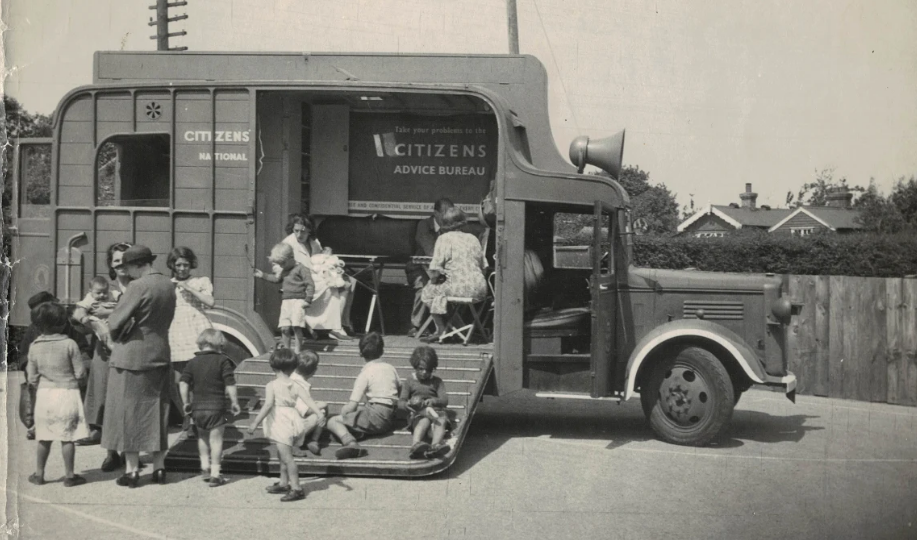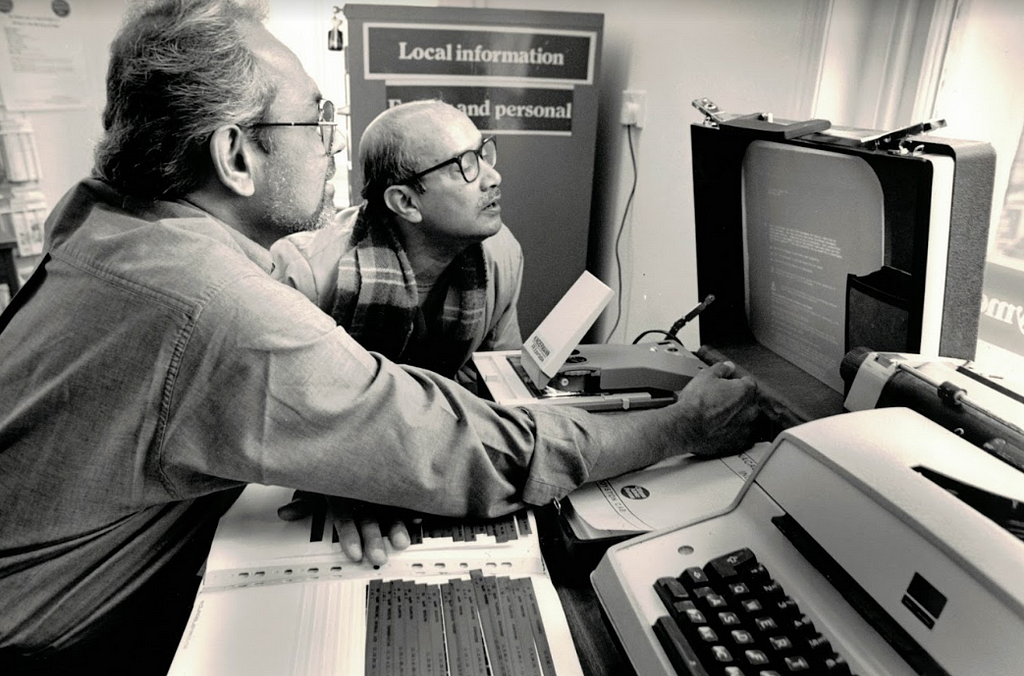80 years of… innovation

From mobile horseboxes to Snapchat — how we’re innovating to meet people’s changing needs

We’re Citizens Advice. We give people the knowledge and confidence they need to find their way forward — whoever they are, and whatever their problem.
Citizens Advice was founded the day after World War II, to help people with problems ranging from evacuation to rations.
Fast forward 80 years and the problems we help people with today have changed fundamentally. Even those that have loomed large throughout our history — like debt, benefits and housing — are now often more complicated and difficult to solve.
All the while, technology has changed the way people want to get advice. While meeting with an adviser in a mobile horsebox may have been effective during wartime Britain, now people expect help on the phone and online — wherever they are and whenever they need help.
We can’t stand still as the landscape of the advice sector changes around us. We’ve continued to innovate throughout our history and we’re going to keep doing this for the next 80 years and beyond.
Getting to the people who need us
An iconic image of our wartime history is the mobile horsebox.

When a raid took place the Ministry of Health would notify Citizens Advice, whose staff would gather in the box and move about the blitzed town offering help to those who needed it.
A lot of people can continue to get face-to-face help from us by walking into their local Citizens Advice. But this doesn’t work for everyone. To help more people we also need to go to where they already are — not in mobile horseboxes, but on mobile phones.
Chat and messaging has proven to be a popular option for clients and advisers — we dealt with over 54,000 chats last year. Demand continues to grow for this service and in the future we want to support more people in a way that’s right for them.
Away from webchat, we’re continuing to experiment and innovate with how we can reach more people digitally to make sure you won’t struggle to get help from us. Take Citizens Advice Liverpool, who give advice over Snapchat.

Leanne Campbell-Syers, Support and Engagement Officer at Citizens Advice Liverpool, explains:
“It was all about using a platform that they already use, that they’re always on, and using the platform to show them things that they don’t know are problems.”
As well, at Citizens Advice Manchester advisers use WhatsApp to keep in touch with clients and follow up after appointments. The local service also delivers advice through Facebook Messenger and is currently testing ways to streamline this process.
“We’re constantly looking at digital solutions which will allow us to help more people as quickly as we can,” says Rosi Avis, Partnership & Communications Lead at Citizens Advice Manchester.
Supporting our advisers, so you get the level of support you need
If you go to a local Citizens Advice — on the phone, on webchat or face to face — you’ll speak to a trained adviser. But what sources do advisers use to help you with your problem?
Previously, it was a paper-based system — each local Citizens Advice had A4 ring binders full of information and advice content, on various subject areas (which were numbered between 1 and 14). If there was an update to the law in one of these areas, advisers would be sent paper slips that they’d cut out and stick into the handbooks.
It was difficult to lug these books between locations, so local outreach services used microfiches instead. Information was printed on small, transparent cards which were easier to store than big books. The information was then expanded using a digital lens so advisers could read it.

This system was replaced in the mid-2000s with the advent of AdviserNet.
AdviserNet is a website for advisers that is still in use today (though it looks very different now).


But even in its current form, AdviserNet isn’t perfect. We understand that it can be stressful for advisers when they’re seeing clients and can’t find the information they need quickly, and that sometimes the level of detail in the content isn’t right. These are big focuses for us in recent and coming months.
We’ll speak up for you
No one else sees so many people with so many different kinds of problems, and that gives us a unique insight into the challenges people are facing today. With the right evidence, we can show big organisations how they can make things better for people.
But how do we get this evidence?
The answer lies in case recording, which had long been done on paper sheets. Guidance on how to do this existed from the early beginning of running a service, with a handbook produced in 1948 covering the essentials.

These case records included social policy codes, so we could see which issues we were helping people with. Volunteers would analyse the data manually so it was far from an easy task — but it did provide the basis for our earlier advocacy work, such as around the community charge in the 1980s.
Gone are the days of recording case details on paper. An electronic system came in in 2002 and now advisers use an in-house case management system called Casebook.
Casebook was designed by us, developed by us and hosted by us and has transformed how local Citizens Advice record and manage cases. As Citizens Advice Sheffield’s Service Manager, Chris Walker, says:
“What this transformation ultimately means is that our advisers can spend less time writing up, and more time helping the clients in the full waiting room — they can help more people.”
It also means we can better analyse our data to lobby for the issues that matter to our clients most. You can read more about our advocacy work on our blog.
Innovating for the next 80 years and beyond
While we’ve come a long way since our inception in the war, there’s still so much more innovating we can do to make sure people get the support and help they need.
At a national level, we’re working on transforming the experience people have when using our online advice content, so we can meet more demand and create a seamless customer journey. We’re also undertaking an ambitious replatforming of the technology behind these experiences. Our new advice platform team are taking a content-first approach, putting the advice itself and the many ways in which it will help our users in the future at the heart of its decision making.
Also this year, our innovation lab has brought together local advisers, volunteers, clients and national staff — such as researchers and designers — to experiment around different issues facing local Citizens Advice. These range from automation and whether it’s possible to demonstrate care in human/tech interactions, through to how we can best support people to have the best experience possible in our waiting rooms.
There’s plenty of innovation going on in local Citizens Advice too.
To give you just a flavour, Citizens Advice Bournemouth Christchurch & Poole is experimenting with advice chatbots, while Citizens Advice Southend gives advice to vulnerable people in partnership with Natwest (RBS), helping 1,000 customers a year with credit card debts, current account problems and more. Another example is Citizens Advice Craven & Harrogate Districts, which has recently installed contactless donation kiosks in its reception to make fundraising quick and easy.

You can read more about how we’re continuing to innovate in the ‘How we work’ section of this blog.
It’s our 80th birthday on 4 September — the day after World War II broke out. We’re sharing blogs that look across our history and give an insight into what the service is like today, and what it might be like tomorrow.
We’re Citizens Advice. We give people the knowledge and confidence they need to find their way forward — whoever they are, and whatever their problem.
80 years of… innovation was originally published in We are Citizens Advice on Medium, where people are continuing the conversation by highlighting and responding to this story.
